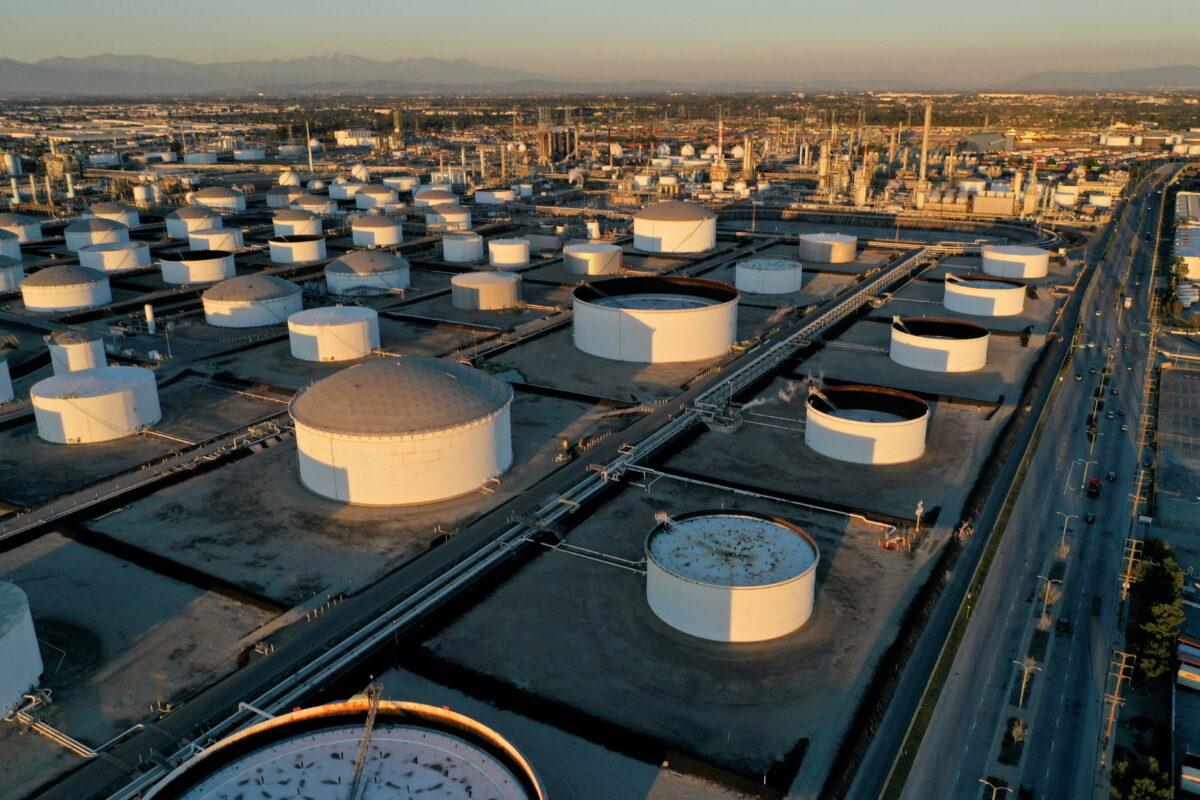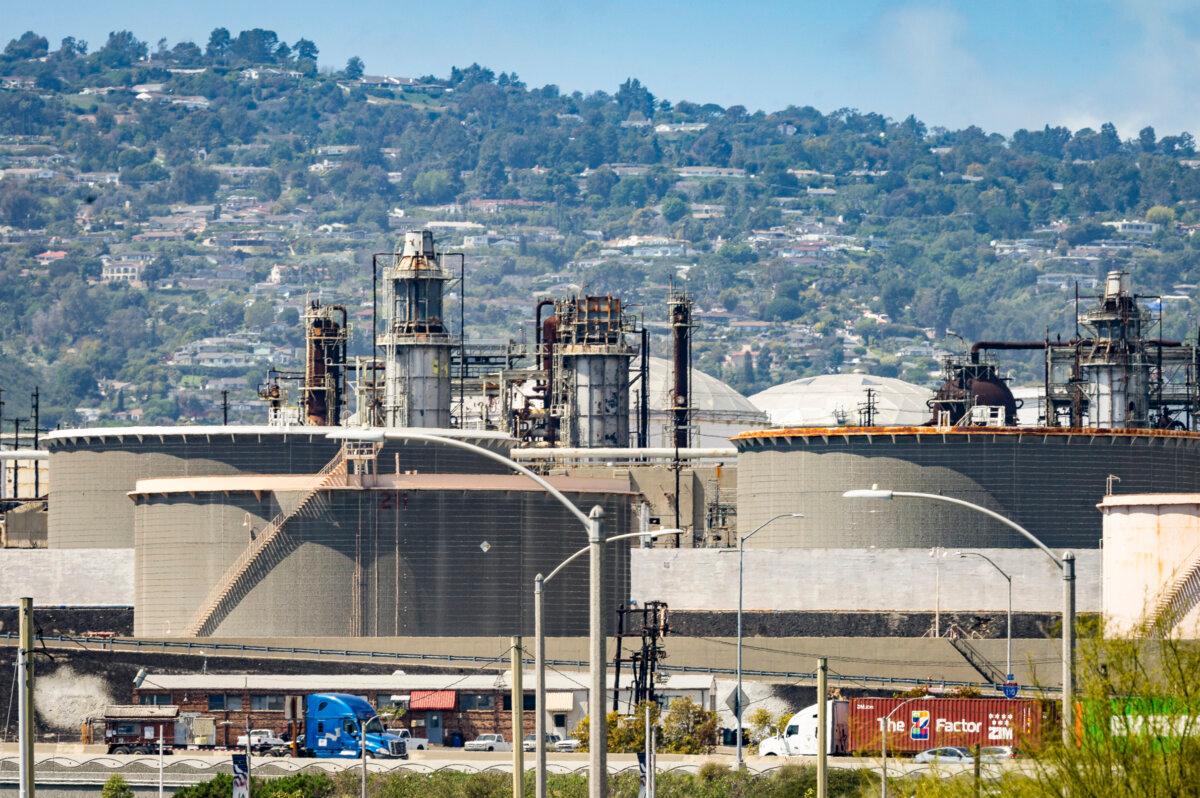State lawmakers criticized California’s environmental and energy agency directors during a legislative hearing on May 28, with some saying oil industry regulations imposed by the agencies are causing refineries to close and gas prices to rise.
“We have a crisis on our hands that may have been self-created by the actions that perhaps have been taken by the state—by regulators,” Democratic Assemblyman David Alvarez of San Diego said during the Assembly Utilities and Energy Committee hearing. “And I think it’s important that we take the time today to understand what those are.”
Gas prices in California hit an average of $4.78 a gallon as of May 31, according to the American Automobile Association, well above the national average of $3.15, and are expected to rise even more after two major gasoline producers leave the state.
Starting in 2022, Gov. Gavin Newsom led a charge to “take on Big Oil” after gas prices spiked. Newsom blamed industry gouging for higher prices and backed the nation’s first-ever law to penalize oil companies for “windfall profits,” speeding it through the Legislature in one week in 2023.
Alvarez said testimony by regulators did not back up the price gouging claim.
“I don’t see anything that’s sort of a smoking gun from a data set perspective,” Alvarez said. “Here we are, more than six months after [a 2024 special session about gas prices] when we were acting with urgency because of price gouging and skyrocketing fuel costs, and I don’t hear today any evidence that that actually occurred. Quite the contrary.”
The heads of California’s environmental and energy regulatory agencies—the California Air Resources Board (CARB), California Energy Commission, and the newly appointed director of the state’s Division of Petroleum Market Oversight—gave an hour-long presentation about the state’s energy regulations and industry data.
Democratic and Republican state leaders have since publicly responded to the committee’s statements, some calling for the resignation of CARB Chairwoman Liane Randolph.
“Bipartisan calls are mounting for Newsom’s Air Resources Board Chair to resign,” Senate Minority Leader Brian Jones, a Republican from San Diego, posted on social media platform X on May 30.
Jones accused Randolph and the governor of using regulations to “jack up gas prices and force Californians into [electric vehicles].”
Democratic Assemblywoman Jasmeet Bains of Delano also called for Randolph’s immediate resignation on May 30.
CARB does not analyze the impact its regulations will have on retail gas prices, said Bains.

Storage tanks at Marathon Petroleum's Los Angeles Refinery in Carson, Calif., on March 11, 2022. (Bing Guan/Reuters)
Randolph acknowledged this point at the hearing, and Bains issued a response on May 30.
“CARB has been given so much power, they were prepared to ban gas and diesel cars and trucks singlehandedly,” Bains said in a statement. “It is outrageous the director would pursue such policies without even trying to analyze the impact on prices.”
CARB spokeswoman Lindsay Buckley said on May 30 that the chair intends to continue her work.
“The attacks on the Chair’s comments lack context,” Buckley told The Epoch Times in an email. “To be clear, CARB does analyze the overall costs to consumers. The Chair specified and clarified again later in the hearing that CARB follows the full letter of the law and prepares a regulatory impact assessment for all major regulations.”
The assessment includes overall economic and fiscal impact studies to “ensure benefits outweigh costs,” she stated.
Randolph “has dedicated her life to public service and remains committed to working with the Legislature” to address affordability concerns, including the costs of climate impacts, according to Buckley.
During the hearing, California Energy Commission Vice Chair Siva Gunda confirmed the refinery closures would lead to a “significant increase” in gas prices.
The state also expects an immediate gas shortage when Phillips 66 shutters its refinery in Southern California by the end of 2025, Gunda reported.

The Phillips 66 refinery near the Port of Los Angeles on March 28, 2025. (John Fredricks/The Epoch Times)
The company plans to continue supplying Southern California with gasoline processed at its Texas refinery by delivering it on tanker ships, which will not help Northern California consumers after a second refinery closes in 2026, according to Gunda.
Texas-based Valero Energy Corp. also announced in April that it would cease operations at its Benicia Refinery in Northern California by the end of April 2026.
Valero’s refinery closure is expected to impact Northern Californians much more severely than the southern area drivers, according to Gunda.
The state does not have a pipeline to carry gasoline supplies between southern and northern cities, which worsens the shortage for the north, he stated.
“That would be a problem in terms of just managing demand and supply,” Gunda said. “We really only have one choice today, which is increasing imports.”

Gov. Gavin Newsom speaks at the Capitol in Sacramento on March 28, 2023. (Courtesy of the Governor's Office)
Democratic Assemblyman Mike Gipson of Carson said he was concerned about the companies leaving and the loss of revenue and jobs they generate.
He was also concerned about importing gas from countries that didn’t have similar protections on human rights, civil rights, and children’s rights. The increased tanker traffic would also cause more emissions, he said.
“If you increase the vessels, that means more emissions, because we don’t control the emissions,” Gipson said.
CARB Chair Randolph said the state had some port regulations, but she agreed with Gipson.
“You are correct, that additional marine traffic would implicate air quality issues beyond state waters that we do not regulate,” Randolph said.
Committee Chair Assemblywoman Cottie Petrie-Norris, a Democrat from Irvine, said the decisions by Phillips 66 and Valero to close refineries were a “pivotal moment” in the state’s transition to renewable energy sources.
Legislators and the public were concerned about the impact of the closures on the state’s gasoline supply and prices at the pump, Petrie-Norris said.
“People want it all. And so, it’s on us to navigate this transition in a way that is balanced,” she said. “And I really believe in a way that keeps affordability front and center.”

The Valero Wilmington refinery adjacent to the ports of Long Beach and Los Angeles, in Los Angeles, on April 10, 2025. (Patrick T. Fallon/AFP via Getty Images)
State leaders could lose the support of Californians if they aren’t careful about their strategy, she added.
“We’ve been able to lead on climate because we have had the support of Californians,” Petri-Norris said. “And, if we’re not careful about this—if we’re not strategic about this—we are going to squander that support and not be able to lead as we move forward.”
The annual hearing focused on the impacts of California’s aggressive climate action agenda on gas supply and consumer prices.
Petroleum Market Oversight Director Tai Milder, a former state prosecutor who has sued oil companies in the past, said his research shows there was “no market manipulation” in 2022 and price spikes have flattened since. However, his division has uncovered what they believe is a “mystery gasoline surcharge” that results in Californians paying 41 cents per gallon extra since 2015.
“Before 2015, California prices were in line with the rest of prices in the U.S. after you account for taxes and fees,” Milder said. “What changed in 2015 to make the ‘mystery surcharge’ appear? We’re going to jump into the data and try to answer that question.”
Energy Commission Vice Chair Gunda claimed the state’s data show some larger oil companies make more profit than smaller companies.
“The profit margins for different industry players is not the same,” Gunda said. “We have people who are able to have a little bit more profit than others.”
Sen. Jones said the hearing showed how Democratic lawmakers “are finally waking up” to the state’s energy problems.
“We’ve been sounding the alarm for years,” Jones wrote on X on May 29. “Their excessive regulations/taxes are driving refinery closures, tightening supply, raising emissions and pushing us toward $8 gas.
“It’s not too late to work together [and] protect our fuel supply,” he said.
California Rep. Vince Fong (R-Calif.) of Bakersfield said the state’s Democratic government needs to rescind what he said are “poor energy policies.”
“The solution is ... allowing us to produce oil and gas in California,” Fong said.














